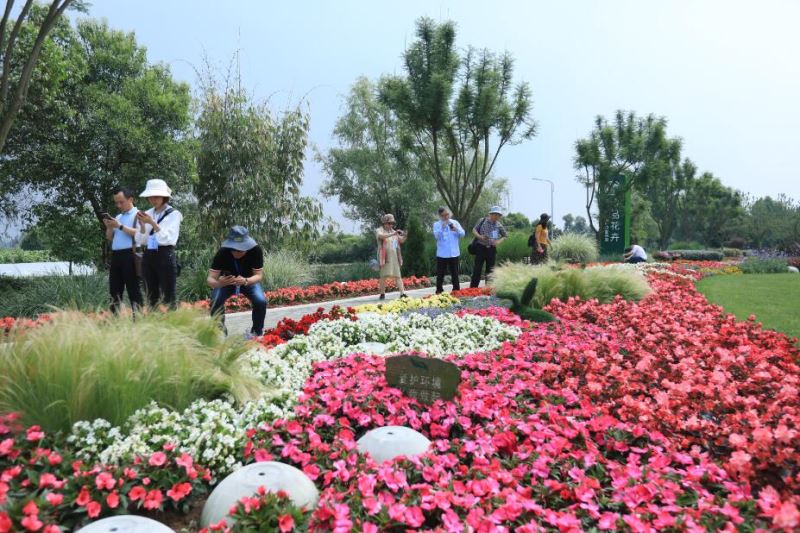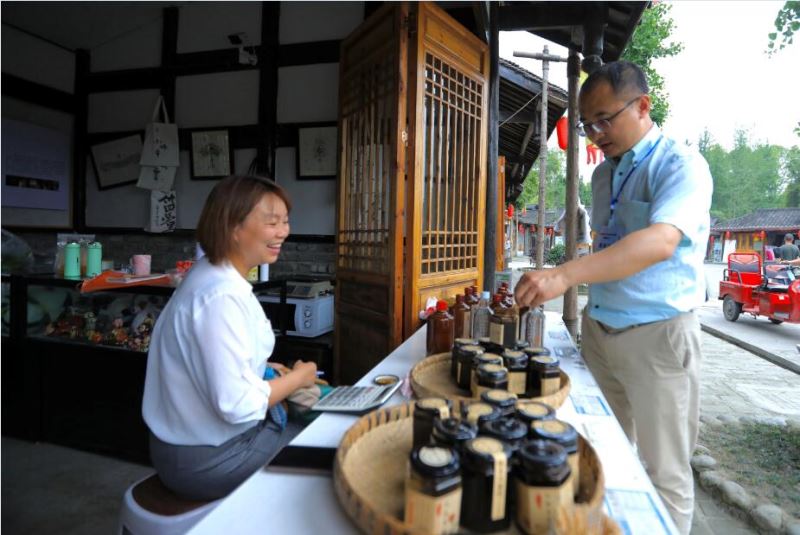Tourists take photos at Benary (Chengdu) Flower Seedling Innovation Base
By Shan Peng and Wang Jue
Southwest China’s Pidu District has rapidly become a shining example of the country’s efforts to revitalise its vast rural areas.
Once a poverty-stricken area with underdeveloped infrastructure, Donglin, a village in Southwest China, has witnessed remarkable changes amid the country’s rural revitalisation efforts.
The village now looks like a bucolic landscape painting with flourishing crops, wildlife and art installations. Located in Pidu District, Chengdu, capital of Sichuan Province, Donglin Village makes for an idyllic weekend getaway for local city dwellers looking for a relaxing experience.
The changes in Donglin epitomize China's sweeping revitalisation efforts, a nationwide strategy promoting rural development.
February 2021 saw the inauguration of the National Administration for Rural Revitalisation, a central agency tasked with overseeing rural revitalisation. In April, China passed the Rural Revitalisation Promotion Law, a move set to fast-track rural development and maintain environmental protection.
Local governments are also taking action. Sichuan Province has also rolled out its own rural development campaign focused on a wide range of areas, including modern agriculture, farm produce, infrastructure, environment, ecological construction, public service and rural governance.
As part of its own efforts to press ahead with rural revitalisation, Pidu District has been developing its local industries, particularly the floral industry. Every year, Jinpin Seed Breeding Company, a joint venture with German company Benary, introduces and promotes more than 100 floral species. It has trained over 5,000 technicians and helped local villages grow more than 666.5 hectares of flowers.
Tourism is another key driver of rural revitalisation. Many villages are tapping their natural and cultural resources to develop specialty tourism. Eighteen Countryside Workshops in Pidu District's Zhanqi Village is a cultural area with West Sichuan-style dwellings. Among its dense trees and winding corridors, tourists can experience the production of authentic traditional arts and crafts, such as cloth shoes, Pixian bean paste, cooking oil, and Sichuanese embroidery.
A customer buys local produce at Zhanqi Village, Pidu District, Chengdu
Zhanqi Village has seen more than 2.7 million visitors over the past three years, with total revenues from tourism topping 189 million yuan (US$ 29.5m).
Job training is another avenue for rural revitalisation. Pidu is home to the Zhanqi Institute, which offers targeted training to officials, farmers, experts and skilled workers, many of whom are serving as the backbone of China’s rural revitalisation. Since opening in February 2019, the institute has trained more than 50,000 trainees from across the country.
Positioned as a provider of “accessible, special and practical” training, the institute focuses on exploring key areas of rural revitalisation with its faculty of “top experts, part-time lecturers and rural experts.”
It is also cooperating with multiple higher education institutions and research agencies, including Tsinghua University, Tongji University, Sichuan Agricultural University, Southwest University, and the Sichuan Academy of Social Sciences.
Zhanqi Institute has hosted more than 10 experts and scholars, such as Li Changping, head of the China Rural Planning and Design Institute. It has also selected a team of lecturers comprised of village officials, rural entrepreneurs, skilled professionals and experts, that offers targeted training to address urgently needed skills among students, such as basic technology and public health courses.
版权及免责声明:凡本网所属版权作品,转载时须获得授权并注明来源“英国富中传媒”,违者本网将保留追究其相关法律责任的权力。凡转载文章,不代表本网观点和立场。版权事宜请联系:619378122@qq.com。

